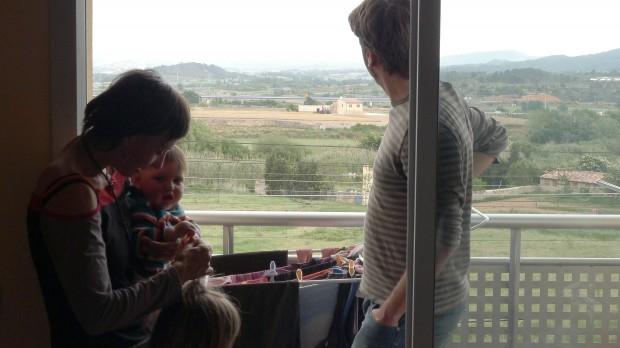As Spain’s economy struggles, some jobless Spaniards turning to the country life
Max and Susana left Barcelona after Max lost his job. Since then they’ve been traveling and trying to make a life in the countryside. (Photo by Gerry Hadden.)
Spain continues to feel the heat from investors as the country’s borrowing costs remain high.
But that’s not the only problem: unemployment is now over 24 percent — more than 50 percent among Spain’s youngest workers. As a result, some young city dwellers are throwing in the towel and heading for the countryside.
When Max, a 20-something Spanish salesman, lost his job selling supplies to local governments a couple of years back, he didn’t freak out or get depressed.
“I found out I was getting fired and I was happy about it,” he said, though he couldn’t start celebrating in front of his boss. “I realized that our life in downtown Barcelona, with all the noise and pollution, was a hostile environment for a kid.”
Max and his partner, Susana, a former social worker, have a 4-year-old and a baby. They are what people here are calling “neo-rurales” or, the new rural folk — unemployed urbanites who decide to leave their city lives behind.
Max and Susana travelled for a few months in Latin America, and then took over an organic farm here in the Spanish countryside.
How hard could it be, right?
“The first thing you realize is that life in the countryside is hard,” Max said. “Lots of people imagine kicking back in a hammock, but you can’t. You’ve got fences to fix and animals to feed. There are so many tiny things to do.”
And learn, he said — even the simplest things, like staking the tomato plants so they don’t fall over. When you’re from the city you just don’t know these things. Max said that local farmers were always willing to offer advice, even if they regarded the newcomers as a bit weird.
“City folk come to the country with strange ideas,” Max said, “like, it’s wonderful to bathe in a freezing river. The local farmers think we’re nuts. They have hot water in their homes, and big plasma screen TVs. We city folk romanticize the countryside.”
They’re even blogging about their new lives.
A couple of hours away, in the mountainous region of Aragon, another young family, Marta and Xavi and their two kids, are giving country life a go. On a recent afternoon, as the kids get home from their one room schoolhouse, Marta heats up some pasta on a solar stove. She serves it up at a table in a yurt. There’s no electricity out here.
Marta and Xavi are building a hay-bale guesthouse, for tourists, which they say will be the biggest one in Spain, when it’s done. The whole project is about sustainability and self-sufficiency.
Unlike Max and Susana, Marta and Xavi didn’t lose their jobs to Europe’s ongoing financial crisis. They quit — on purpose.
Marta worked in a bank, and Xavi owned a construction company. Banking and construction — the two sectors that have brought Spain’s economy to its knees. Marta said they both had front row seats to the impending disaster.
“I started thinking, how can it be that all this fictitious money dominates our lives? I’m referring to the markets, this is money that no one ever actually touches,” Marta said. “It’s all moving around via computers. We have to get our feet back on the earth.”
So with a dream of living in the mountains, they came here. They’re also learning as they go. One thing they’re learning, besides how to make their own clay to side their guesthouse, is that all this costs money — which is partly why this whole “back to the land movement” can’t really be called a movement.
If you’re unemployed in the city, you can’t just move to the country with no savings. What would you eat? Where would you sleep?
When Max and Susana agreed to an interview, they were actually packing their bags for Ireland. The owners of the organic farm they were running had come home. Max and Susana looked around for a new project in Spain, but came up empty.
Max said he knows a lot of people with great ideas for eco-farms and eco-tourism, ideas that could even make money.
“But there’s so much red tape and so many building restrictions in Spain that it just becomes impossible,” he said. “Getting permits can take years. So folks who might not have a lot of money can’t survive long enough to get through the process.”
Max and Susana are going to Ireland to live in a “green” community. It’s affordable, they say, and they’ll learn English. And they hope that one day, Spanish authorities might start making it easier to set up unconventional projects — rural start-ups, as it were.
Then more young people might ditch the cities to give country life a try.
